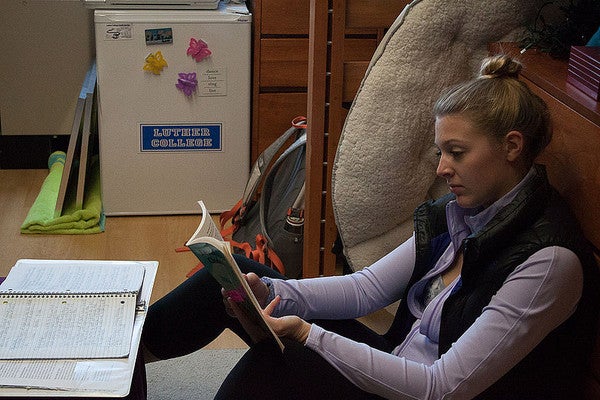Freshman 15
Failing a test. Making new friends. Paying for college. Being safe on campus. Gaining 15 pounds. These are common fears of college freshman. And many, including the mythical “freshman 15” generate unnecessary fear with little data to back them up.
That’s right. The “freshman 15” is a myth. Research dating back to 1985 and as recent as 2017 continue to prove that the average Freshman weight gain is between 1 and 6.6 pounds; averaging 3.86 pounds, rather that the feared fifteen.
The long-standing belief has its early roots in an August 1989 issue of Seventeen Magazine. The article titled “Fighting the Freshman 15” initiated 30 years of worry and subsequent advice giving on preventing college weight gain.
The facts:
It’s common for young adults, both those attending or not attending college, to experience mild weight gain in their early 20’s as the body finishes its maturation process. When a student experiences a significant weight acceleration, it is important to look for the cause. Health professionals speculate that in these situations, a combination of psychological stress, transition difficulties, lack of routine, academic stressors, decreased physical activity, and changes in access to food may contribute. Preparing for these stressors can be valuable for concerned students.
The dark-side of the persistent, unverified focus on the Freshman 15 myth is that it creates fear and excessive worry about food and weight. This fear can lead to unhealthy habits, compensation behaviors and the development of disordered eating. The very problems the increased awareness of college weight gain intended to prevent.
So, what can college student do to combat this fear?
Begin by setting yourself up for success. Make it a priority to develop a good self-care routine from the moment you set foot on campus. Self-care can combat the fears of the Freshman 15 and benefit you in many aspects of college life.
Schedule important “you time”. As you planning your daily schedule include uninterrupted time for regular meals and snacks, daily movement, and a sleep routine that results in 6-8 hours of shut-eye each night.
Set up your surroundings to help you succeed. Stock your room with satisfying snacks for between meals or those times you’re running late to class. Pack a supportive pair of tennis shoes and some athletic clothes to be active in. Prepare to get your zzz’s by bringing along sleep aids like a white-noise machine, a sleep mask, ear plugs or a weighted blanket. Being prepared increases your ability to make self-care a daily habit.
Avoid diets. Studies show, people who diet have the greatest risk of experiencing college weight gain. And, every diet increases a person’s risk of developing an eating disorder. Replace the temptation to diet by being intentional with your eating. Chose food that is satisfying and enjoyable to eat. The practice of eating mindfully keeps you in tune with your body’s natural regulators of hunger and fullness. Learn to trust your body to tell you how much to eat.
Create a list of positive techniques for dealing with college stress. Knowing your best de-stressors can reduce the likelihood you’ll turn to food, abandon activity or short-change your sleep when mid-terms, lengthy papers and finals roll around.
These self-cares basics provided added bonuses, as well. Students who practice these daily habits have greater academic retention (less than 6 hours of sleep 2 nights in a row can reduce retention of learned material by 34%), superior stress management, better mental health and improved weight stability.
So, get out your planner and schedule so “you time” before you arrive next fall.
Related Posts

Getting sick in college can throw off your whole routine. Classes, deadlines, and dorm life don’t ever pause. With a little preparation and the right steps, you can recover and catch up without burning out.

Technology plays an important role in our every day lives, but sometimes it can have negative effects on a healthy lifestyle. Read some tips on ways you can move more and stay fit!
Admissions Office
Luther College
700 College Drive
Decorah, Iowa 52101
Phone: 563-387-1287